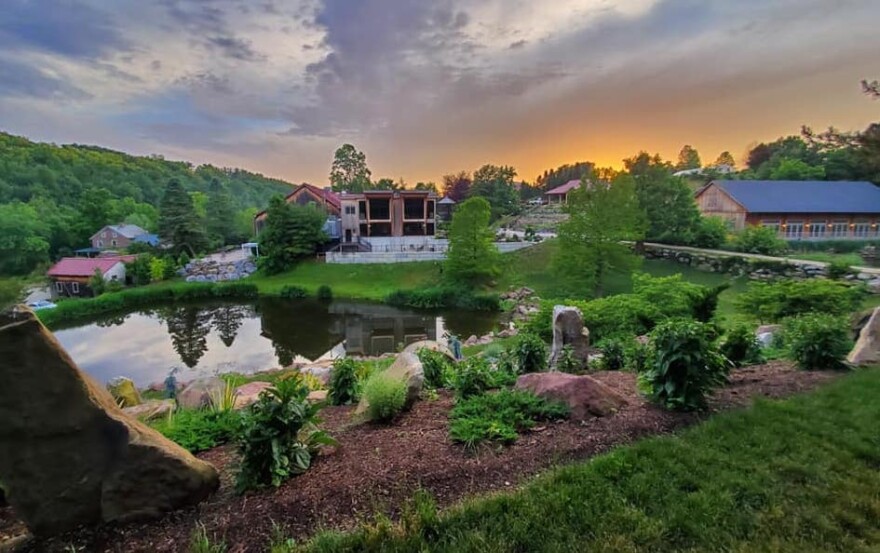WEISENBERG TWP., Pa. — Al Granger, who transformed an abandoned farm into a world-class luxury resort and spa that earned accolades far beyond the Lehigh Valley, has died at age 91.
Granger and his late wife, Elizabeth, founded the Glasbern Inn in the Fogelsville area on a 16-acre farm they bought in 1985.
Today its 150 acres off Packhouse Road boast high-end rustic lodging, organic pastures and an event lodge that has served as the setting for hundreds of weddings and celebrations.
“He was always ahead of the game,” said Erik Sheetz, a former general manager. “The greatest thing was every cent he made, he put it right back into the property.”
Earlier this year, Granger announced he sold the business to the Jaindl Companies, which continues to operate it.
Granger died Saturday, June 22, in Florida, where he moved after closing on the sale, said Beth Vargas, executive innkeeper at Glasbern.
Former staffers described Granger as a brilliant businessman and visionary.
“We grew a lot of our own herbs and grew out of the garden — this was well before everyone else was doing it, farm-to-table,” Sheetz said.
“He was always ahead of the game. The greatest thing was every cent he made, he put it right back into the property.”Erik Sheetz, former general manager at the Glasbern Inn
Granger bought properties around the original farm, hired help to raise his own livestock, and converted old farm sheds into picturesque buildings that complemented the country inn.
They served as backdrops for wedding shoots, romantic getaways and corporate executive events.
National recognition
Several buildings had been on other farms but Granger had them dismantled, moved and then reassembled and enhanced on his own property.
The high-end bed-and-breakfast routinely earned national recognition. It’s registered as a Historic Hotel of America and has been featured in numerous publications.
USA Today named it one of the nation’s 10 best boutique hotels.
Granger's wife, Elizabeth "Beth" Granger, died in 2006. They were married for 49 years, according to her obituary.
“When I heard he had sold, that extraordinarily surprised me. I literally thought he would pass away there."Zeke Zelker, a former Glasbern Inn employee
The quality, service and meticulous detail at Glasbern didn’t come easily.
Al Granger had a short fuse and could be difficult to work with, especially when his exacting standards were unmet, according to those who knew him.
“When I heard he had sold, that extraordinarily surprised me," said Zeke Zelker, a filmmaker and entrepreneur who runs a catering and gourmet meal delivery service.
"I literally thought he would pass away there.
“Al was a very tough individual to work for and he went through staff like toilet paper. There’s more chefs who worked at Glasbern than any other place in the Lehigh Valley.
"On a whim he would let you go — and two months later hire you back. He hired and fired me three times.”
'It was no holds barred'
In one often-told tale, Granger fired a skilled chef who in a snowstorm used one of the property’s snow shovels without permission.
“You’re talking about a guy who showed up at 6 a.m. for breakfast and had dinner there at night. He was always there,” said Sheetz, who worked at Glasbern in the 1990s and has been general manager of Braveheart Highland Pub in Hellertown the past 16 years.
“You’d have a meeting with him at 3 o’clock in the afternoon and be busy for dinner through the end of the night, then come in the next morning at 11 a.m. to do it all over again and he’d be like, ‘Where do we stand on those three things?’ He wanted everything done yesterday.”Erik Sheetz, former general manager at the Glasbern Inn
“You’d have a meeting with him at 3 o’clock in the afternoon and be busy for dinner through the end of the night, then come in the next morning at 11 a.m. to do it all over again and he’d be like, ‘Where do we stand on those three things?’ He wanted everything done yesterday.”
Within the Lehigh Valley hospitality industry, Glasbern had a reputation for paying its managers and chefs handsomely.
“He actually overpaid because he knew how he was,” Zelker said with a laugh.
The two often clashed. Both were in the U.S. Marine Corps — Granger went to the U.S. Naval Academy with business magnate and former presidential candidate Ross Perot — and Granger, an officer, didn’t take kindly to being second-guessed or scrutinized by the lower ranks, Zelker said.
“He supported me when I first started my film career. He liked that I was willing to do something on my own and take risks,” said Zelker, who worked at Glasbern in the late 1990s and early 2000s.
“He was great when you didn’t work for him, but once you did, it was no holds barred.”
'Wanted everyone to care'
Vargas, who still is with Glasbern and runs its operations, worked 22 years for Granger. She said she was saddened by his passing and, as per his wishes, there will be no funeral.
“I will always remember Al for the beautiful inn he created — my second home,” she said. “He always made me feel like he had my back no matter what, and he entrusted me to run his business.
“Even though, yes, at times he did have a high expectation of his employees, it was only to make us better. He wanted everyone to care as much as he did.”
“A lot of us learned a lot of business stuff from Al."Erik Sheetz, former general manager of Glasbern Inn
Braveheart’s Sheetz said many young chefs who worked at Glasbern went on to successful careers in and outside the Lehigh Valley.
It was a training ground — and a proving ground — that prepared one for the topsy-turvy challenges of the hospitality industry.
“A lot of us learned a lot of business stuff from Al,” Sheetz said.
“He believed in crunching profit and loss numbers every two weeks. He said if you waited until the end of the month to crunch the numbers, there’s no way to fix what’s broken.
"If you find something wrong two weeks in, you still have time to adjust and to fix it. That’s something I still do.”


